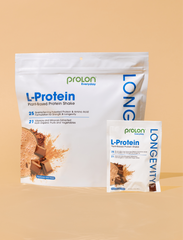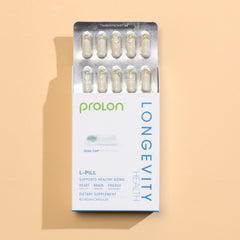
IGF-1: The Truth About Insulin-like Growth Factor 1
Here at Prolon, you may have heard the term “IGF-1” in our discussion of how nutrition can impact your longevity journey. But what exactly is IGF-1, what role does it play in our body’s complex systems, and why do we consider it a key factor in our nutrition technology? Let’s take a closer look at this bioage-influencing hormone.
What is IGF-1?
In simple terms, IGF-1, or insulin-like growth factor 1, is a natural substance in our body that plays a crucial role in helping us grow, develop, and maintain our tissues. It's called "insulin-like" because it has some similarities to insulin, which is known for regulating blood sugar.
IGF-1 is mainly produced in the liver and is stimulated by growth hormone. It acts like a messenger, signaling cells to grow and divide. This is essential for normal growth during childhood, and it continues to be important throughout our lives for maintaining our muscles, organs, and overall body function.
Think of IGF-1 as a key player in the complex system that keeps our bodies in good shape. It helps repair tissues, build muscles, and keeps everything in balance. However, just like with many components of our body, having too much or too little IGF-1 can lead to health issues. It's all about finding the right balance to keep our bodies functioning at their best.
Too high or too low: The delicate balance of IGF-1
Striking the right balance in IGF-1 levels is crucial for maintaining optimal health and well-being. So, what exactly is the optimal level? The effects of IGF-1 can vary among individuals, and the impact of high or low levels may depend on factors such as age, overall health, and the specific context of each person. However, finding the right equilibrium of IGF-1 is essential—enough to support muscle protection and repair but not so much that it tips the scale toward increased risks of age-related diseases like cancer or cardiovascular diseases. This delicate balance underscores the intricate interplay between IGF-1 and our body's complex systems.
When IGF-1 levels are too high or too low, certain health risks are at stake:
Too High IGF-1:
- Increased Cancer Risk: Elevated levels of IGF-1 have been linked to an increased risk of certain types of cancer. This is because IGF-1 promotes cell growth, and when it's too high, it may contribute to the uncontrolled growth of cells, potentially leading to cancer.
- Tumor Growth: High IGF-1 levels have also been associated with the growth of tumors. The excessive stimulation of cell division can lead to the development and progression of tumors in various tissues.*
*A series of studies have shown that high levels of IGF-1 are associated with an increased risk of tumors including prostate, pre- and postmenopausal breast, lung, thyroid, and colorectal cancers (Ma et al., 1999; Renehan et al., 2004; Shi et al., 2001). Furthermore, in worms, flies, and mice insulin/IGF-1 signaling reduces lifespan and healthspan (Bartke et al., 2013; Fontana et al., 2010; Kenyon, 2010; Podshivalova et al., 2017).
In humans, studies on patients with Laron syndrome (LS), whose IGF-1 levels are extremely low, have reported a reduction in pro-aging signaling, cancer, diabetes, and cognitive decline (Guevara-Aguirre et al. 2011; Nashiro et al. 2017). Steuerman et al. (2011) also surveyed 230 individuals with LS and found no cases of cancer.
In fact, a study investigating the relationship between protein consumption and mortality discovered a significant and direct relationship between high protein intake, high IGF-1 levels, and increased hazard ratios for all-cause mortality (Willett & Ludwig, 2020).
Too Low IGF-1:
- Muscle Wasting and Frailty: Insufficient levels of IGF-1 can result in decreased muscle mass and strength, leading to frailty. This is particularly relevant in aging populations, where low IGF-1 levels may contribute to muscle wasting.
- Bone Density Reduction: IGF-1 plays a role in maintaining bone density, and low levels may lead to decreased bone mass, increasing the risk of fractures and osteoporosis.*
*Several studies have found a connection between low levels of IGF-1 and conditions such as cardiovascular diseases (CVD), diabetes mellitus, osteoporosis, and sarcopenia (Garnero et al., 2000; Higashi et al., 2010). (Brioche et al., 2014; Katsanos et al., 2001; Lenk et al., 2010; Saki et al., 2017).
What factors influence IGF-1 levels?
IGF-1 levels are influenced by a variety of factors, including nutrition, exercise, and growth hormone. When we consume food, especially meals rich in protein, our body responds by releasing insulin and growth hormone. This growth hormone then signals the liver to produce IGF-1.
Amino acids, the building blocks of proteins, play a crucial role in this process. Certain amino acids, including leucine, arginine, and methionine, can play a big role in IGF-1 stimulation. Intriguingly, many studies using mice suggest that restricting methionine in the diet can extend the lifespan and enhance overall health by lowering IGF-1 levels.
Protein sources matter. Numerous studies have observed a correlation between the consumption of animal proteins and elevated levels of IGF-1 in the body.*
Conversely, plant-based proteins such as legumes, naturally have lower levels of methionine, leucine, and arginine compared to their animal counterparts. Proteins derived from peas, chickpeas, and black beans not only provide essential amino acids, crucial for muscle health, but also work to limit excessive IGF-1 levels.
The bottom line: Opting for plant-based proteins may not only support overall health but may also promote a longer and healthier life by modulating IGF-1 levels in the body.
*Respondents aged 50–65 reporting high protein intake had a 75% increase in overall mortality and a 4-fold increase in cancer death risk during the following 18 years. These associations were either abolished or attenuated if the proteins were plant derived. Conversely, high protein intake was associated with reduced cancer and overall mortality in respondents over 65, but a 5-fold increase in diabetes mortality across all ages. (Levine 2014)
Prolon Products & IGF-1
Here at Prolon, we’re committed to using the power of science and research to support your health, wellness, and ongoing longevity journey. Using our breakthrough nutrition technology, we meticulously design our products exclusively using plant-based proteins.
Our 5-Day Program works to strategically limit protein intake in order to maintain a fasting state without triggering excessive IGF-1 activation. Our unique approach is powered by the latest scientific findings that reduced protein intake can help modulate IGF-1 levels and support the benefits of fasting.
Additionally, our new Longevity Protein is crafted with plant-based proteins in carefully measured quantities. This allows us to stimulate IGF-1 just enough to support muscle protection while still avoiding excess IGF-1 activation that could be linked to a negative impact on the body.
We want you to feel confident that the products we craft leverage the latest science for holistic well-being and longevity.













